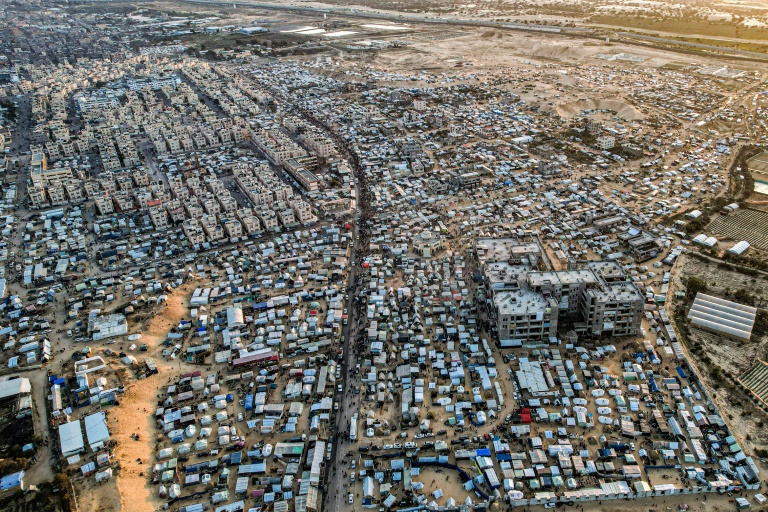At the gates of Gaza, Egypt’s perilous balancing act

The hundreds of thousands of Palestinians who have poured into Rafah from other parts of war-torn Gaza have created a vast makeshift encampment stretching along the Egyptian border
Cairo – Since the Gaza war broke out in October, Egypt has faced a difficult dilemma, seeking both to show solidarity with the Palestinians and to preserve its relations with neighbouring Israel.
The Rafah crossing point between Egypt and Gaza is in theory the besieged territory’s only opening to the world that is not under direct Israeli control.
In practice, Israel retains control over all goods passing through the crossing, including humanitarian aid intended for Gaza, which is suffering dire food shortages that the UN fears will spark “starvation”.
Regularly, voices are raised to demand that Egypt open its border to the Palestinians, and Israel accuses it of doing too little.
“Lie,” replies the spokesperson for the Egyptian state, Diaa Rachwan, who points to “deliberate obstruction” by the Israeli army.
Only around 14,000 trucks have been able to enter the Gaza Strip so far, according to the UN, five times fewer than before the start of the Israel-Hamas war on October 7.
Dima Alsajdeya, researcher at the College de France, explained that “on the ground Egypt obeys the orders of the Israelis. It sometimes tries to negotiate but ends up respecting the conditions imposed by the Israelis”, including painstaking inspections which lead to delays.
On at least five occasions, Israeli airstrikes or artillery fire hit the terminal, interrupting the flow of aid trucks.
– Ready for ‘all scenarios’ –
Egypt, which with Qatar and the United States, helped broker a week-long truce and hostage-for-prisoner exchange in late November, only speaks out clearly on one subject: humanitarian aid.
Since Israeli Prime Minister Benjamin Netanyahu gave orders on February 8 for the army to begin preparations for an offensive on Rafah, Egyptians have voiced fears of the catastrophic scenario they warned against from the start of the war: a forced displacement of Palestinians to Sinai.
Egyptian officials say they are ready for “all scenarios” but refuse to comment on the possible consequences of an assault on Rafah, presented by Israel as the final blow against Hamas in response to the October 7 attack on Israel.
Nearly 1.5 million Palestinians crowded into the city fear the worst, but “if Palestinians are deported to the Sinai, Egypt fears they will disperse across its territory and wants to contain them in an area developed in advance,” said Alsajdeya.
Satellite images seem to confirm this.
Officials and experts have reported a 13 square kilometre enclosure to shelter “more than 100,000 people”, according to the Wall Street Journal.
Egyptian officials formally deny this, but two local business leaders confirmed to the NGO Sinai Foundation for Human Rights that they had won contracts to build a closed area “surrounded by seven-metre-high walls”.
Israel officially denies any “intention to evacuate Palestinian civilians” into Egypt, even as several government ministers have openly called for the displacement of all Gazans.
Arab countries strongly oppose the idea of creating new Palestinian refugees because those who were driven out or fled during the 1948 war that accompanied Israel’s creation, or during the 1967 war that saw Israel occupy the West Bank and Gaza, are still campaigning for their “right of return”.
And Egypt, the only Arab country bordering Gaza, has an additional concern in mind: it fears Hamas, close to its enemy the Muslim Brotherhood, entering its territory.
– ‘Cornerstone of stability’ –
Israel and Egypt signed a peace treaty in 1979 and, “for reasons of military and security coordination, neither the Egyptians nor the Israelis want a suspension,” said Alsajdeya.
Israeli Defence Minister Yoav Gallant recently stressed that “we respect and value our peace agreement with Egypt, a cornerstone of stability in the region and an important partner”.
“This peace treaty has survived” all the upheavals of the Israeli-Palestinian conflict, added Alsajdeya, and since the start of the war between Israel and Hamas, Egypt has never summoned the Israeli ambassador to Cairo nor called into question diplomatic ties.
Even when Egypt accused Israel of seeking to “legitimise its attempt to occupy the Philadelphi Corridor,” a road that runs along its border with Gaza, it contented itself with a written statement.
While thousands of tonnes of aid are piling up at Egypt’s El-Arish airport, the international community is now counting on a maritime aid corridor between Cyprus and Gaza.
There too, “a security check corresponding to Israeli standards” will be put in place, making Gazans fear yet more lengthy delays.
